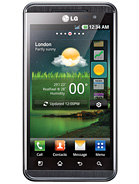
LG has had a good run of form with its Optimus series of smartphones. The Optimus One was a solid little thing for a good price, then it branched out and up into fancy phone territory with the quirky dual-core charms of the Optimus 2X, before tackling high style with the skinny Optimus Black.
Now LG has another demographic in its sights – fans of the hot trend for 3D technology. The Optimus 3D is the first smartphone to launch with a "glasses-free" 3D display, enabling users to take still photos and record videos in full 3D, then play them back in 3D on the phone's cutting-edge 4.3-inch display.
But thanks to what LG calls the phone's "tri-dual" technology – a dual-core processor, dual cameras and dual-channel memory – the Optimus 3D comes with a massive price tag. The cheapest monthly tariff for this monster 3D phone currently stands at £35, with SIM-free prices currently around the £500 mark.
We've
dusted off the Celluloid Movie Maker for a session with the new 3D
phone - check out what we thought with flickering images:
Is it worth paying such a hefty early adopter tax in return for LG's –
and the world's – first glasses-free 3D mobile phone display?

These buttons are backlit, but the light only comes on when you press one of them. Which makes the backlight absolutely useless, as there's no point in a button lighting itself up once you've just pressed the wrong one. A weird feature, that.





| General | 2G Network | GSM 850 / 900 / 1800 / 1900 |
| 3G Network | HSDPA 900 / 1900 / 2100 | |
| HSDPA 850 / 1700 / 2100 | ||
| SIM | Mini-SIM | |
| Announced | 2011, January | |
| Status | Available. Released 2011, July | |
| Body | Dimensions | 128.8 x 68 x 11.9 mm (5.07 x 2.68 x 0.47 in) |
| Weight | 168 g (5.93 oz) | |
| Display | Type | 3D LCD capacitive touchscreen, 16M colors |
| Size | 480 x 800 pixels, 4.3 inches (~217 ppi pixel density) | |
| Protection | Corning Gorilla Glass | |
| - LG 3D UI | ||
| Sound | Alert types | Vibration, MP3 ringtones |
| Loudspeaker | Yes | |
| 3.5mm jack | Yes | |
| Memory | Card slot | microSD, up to 32 GB |
| Internal | 8 GB storage, 512 MB RAM | |
| Data | GPRS | Class 10 (4+1/3+2 slots), 32 - 48 kbps |
| EDGE | Class 10, 236.8 kbps | |
| Speed | HSDPA 14.4Mbps (21Mbps with update), HSUPA 5.76Mbps | |
| WLAN | Wi-Fi 802.11 b/g/n, DLNA, Wi-Fi hotspot | |
| Bluetooth | Yes, v2.1 with A2DP, EDR | |
| USB | Yes, microUSB v2.0 | |
| Camera | Primary | Dual 5 MP, 2592х1944 pixels, autofocus, LED flash, check quality |
| Features | Stereoscopic photos & videos; geo-tagging | |
| Video | Yes, 1080p@30fps (2D), 720p@30fps (3D); video stabilization, check quality | |
| Secondary | Yes | |
| Features | OS | Android OS, v2.2 (Froyo), v2.3, upgradable to v4.0 (Ice Cream Sandwich) |
| Chipset | TI OMAP 4430 | |
| CPU | Dual-core 1 GHz Cortex-A9 | |
| GPU | PowerVR SGX540 | |
| Sensors | Accelerometer, gyro, proximity, compass | |
| Messaging | SMS (threaded view), MMS, Email, Push Email, IM | |
| Browser | HTML, Adobe Flash | |
| Radio | No | |
| GPS | Yes, with A-GPS support | |
| Java | Yes, via Java MIDP emulator | |
| Colors | Black, White | |
| - SNS integration | ||
| - HDMI port | ||
| - Google Search, Maps, Gmail | ||
| - YouTube, Google Talk | ||
| - MP4/DivX/XviD/H.264/H.263/WMV player | ||
| - 1080p@30fps (2D), 720@30fps (3D) playback | ||
| - 3D/2D video editor | ||
| - MP3/WAV/WMA/eAAC+ player | ||
| - Document viewer/editor | ||
| - Organizer | ||
| - Voice memo/dial/commands | ||
| - Predictive text input | ||
| Battery | Li-Ion 1500 mAh battery | |
| Stand-by | Up to 450 h | |
| Talk time | Up to 13 h (2G) / Up to 9 h (3G) | |
| Misc | SAR US | 0.55 W/kg (head) 1.12 W/kg (body) |
| Price group | ||
| Tests | Display | Contrast ratio: 1068:1 (nominal) / 1.542:1 (sunlight) |
| Loudspeaker | Voice 67dB / Noise 66dB / Ring 82dB | |
| Audio quality | Noise -86.5dB / Crosstalk -87.4dB | |
| Camera | Photo / Video |







0 comments:
Post a Comment